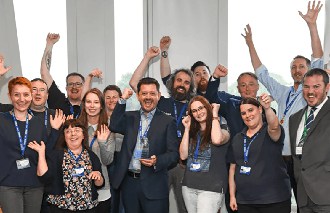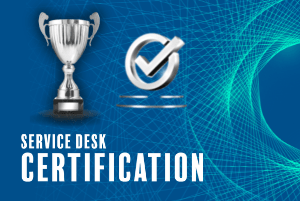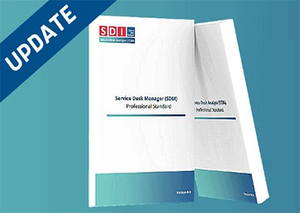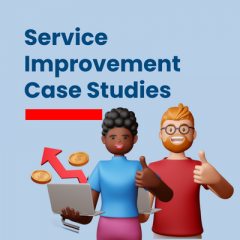
Are you a people focused organisation?
by Jamie Bell, Service Desk Specialist, SDI
“We are a customer focused organisation”
“Our customers are what make our business great”
“We work with some very exciting and innovative clients”
At some point during a working year, no doubt you’ve heard these types of phrases uttered by a senior figure within a business, particularly if that business is very commercially driven. For me, there’s nothing wrong with any of them, but it does leave me thinking about where employees fit in to the business’ consciousness.
For a service desk to be successful, customers must be happy and receive value from the service, that goes without saying. It’s how we deliver the value that is important. I believe the key to long lasting customer satisfaction lies with the people providing the service. Specifically, how happy, motivated and engaged the staff are with the organisation they are employed by.
During the most recent Service Desk Institute benchmarking survey, some interesting statistics emerged concerning service desk leavers:
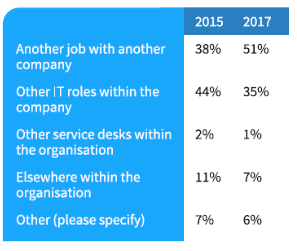
The table shows that there has been a steady decline in the number of employees that move to other roles within the organisation, coupled with a steady increase in the number of staff that leave the company altogether. Why is this concerning? One theory could be that the data suggests businesses may not be putting enough focus on their employees.
What is the impact?
Replacing staff can be an expensive activity. Beyond the hit to the bottom line, there’s the possibility that staff may leave for a competitor. Then there’s the time spent recruiting, inducting and training new employees. Another negative, often overlooked, is the impact this has on the remaining staff, their workload, their perception, their morale, their productivity. An unproductive, demotivated, and overworked service desk analyst is probably not going to be delivering the best possible customer service experience.
In these cases, the customers of a service desk which is not effective enough in its service delivery could also notice the impact of employee turnover through the loss of knowledge.
How do we stop people leaving?
To understand how to stop people leaving, we need to understand why people leave. If a situation presents itself where an employee opts to leave, an exit interview should be held to help understand why. The information gathered can feed back into improvement initiatives.
The most common reasons people may leave an organisation include:
- Lack of direction and leadership
- Unable to realise potential
- Feel undervalued with a lack of recognition
- Poor corporate culture
- Unclear career paths
“Retaining the best and brightest is what ultimately matters. The most innovative and successful companies today have figured that out. They’ve taken retention efforts to an advanced level.”
Lynn Taylor – Workplace Expert and Bestselling Author
Tips on keeping staff engaged, motivated and happy
A person looking to join an organisation will want to understand what their career options are. This is no different for a person that has established themselves within the company. Regular 1-to-1 meetings and job documentation reviews will help to keep staff abreast of any career or development opportunities. It’s important to be transparent and consistent regarding the roles within the organisation and the possible paths to progress.
Reward and recognition can help ensure that employees feel valued and that their contribution is recognised. To some, this may seem like an extra expense. That doesn’t need to be the case. At a recent SDI event, Service Desk 2.0, Grant Harris – Head of IT Operations at West Sussex NHS Foundation Trust, demonstrated how he had created a scheme to reward employees with exposure to other areas of the organisation, that they may not necessarily get to experience, benefiting the individual with development and the organisation with increased engagement.
Culture and leadership, where managing people is concerned, comes down to treating staff with respect. Leading by example, creating an inclusive, diverse, accountable, and responsible environment. Little things that may seem insignificant, like referring to employees as ‘people’ instead of ‘resources’, taking an interest in an employee beyond “What have you got on today?” Or simply being approachable and welcoming, all go a long way to contributing towards a happy environment.
What are the outcomes of a happy workforce?
I mentioned earlier that a disgruntled employee is unlikely to be providing a great customer service experience. The reverse is also true. An engaged, motivated and happy employee will be more productive and more inclined to provide an excellent customer experience. It is also more likely that they will remain in the organisation for longer, retaining knowledge, embracing the culture, and adding value.
As an organisation grows, it will be easier for new recruits to embed within their respective teams and to start adding value more quickly, when a workforce is happy.
“If you look after your staff, they’ll look after your customers. It’s that simple. ”
Richard Branson – Founder of Virgin Group
In summary, ensuring a workforce is a happy workforce doesn’t have to be an expensive exercise. However, it does require dedication and commitment to ensuring that there is a consistent and transparent approach to reward and recognition, leadership and culture, and career development. The benefits of being successful in achieving a happy workforce are there for all to see.
I think it’s important to point out, that when discussing why people leave or how to prevent people leaving an organisation, salary and employee benefits have not been mentioned once. I would argue that these two things are at their most important to an individual when they are seeking a new opportunity. A separate blog discussing salary and employee benefits will follow in the new year.

